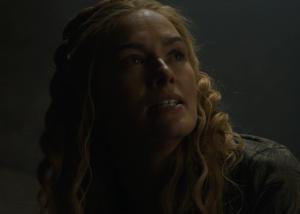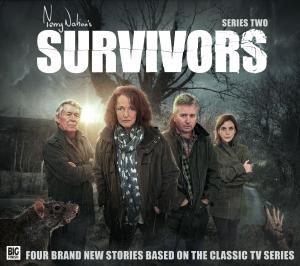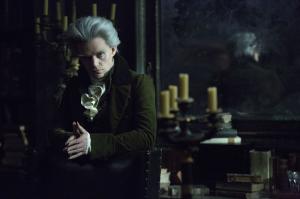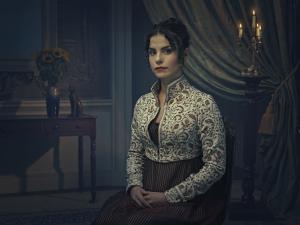
7) The Gift 8) Hardhome. HBO/ Sky Atlantic - 2015
This season is the most radical yet in condensing and altering the storylines of the source novels by George RR Martin. But many decisions seem for the best. These latest episodes have much to do, and generally do those things with conviction. Pacing is no longer ponderous, and some wonderful production values are evident for all to see.
The Gift is a title with many different meanings; most obviously being Jorah's presenting Tyrion to his former Khaleesi, and Littlefinger assisting the
Faith of the Seven's relentless pursuit of the 'truth' in getting Lancel to betray his own cousin Cersei.
Hardhome is rather clearer in its connotations; the heart of the episode involving a Battle Royale, but one rather one-sided towards the forces of darkness. The usual number of set up scenes and character development also feature, which ultimately make the episode a truly special one and rather difficult to top for the next pair. This is notable, as traditionally Episode Nine gets the most attention from Thrones' creative and production talents.
We now must bid goodbye to Maester Aemon, who has been a wonderfully acted by Peter Vaugn since the opening season of the show. It may be surprising but this is effectively the first character to die of nothing more than old age and related natural illness. The Night's Watch give him a suitable send off as Sam's speech emphasises Aemon's worth - particularly his decision to forsake his (limited) prospects of sitting on the Iron Throne.
However it also becomes clear that Alliser Thorne is still a difficult man to deal with; despite Jon's gracious decision to keep him as a second-in-command. Thorne threatens Sam, noting that his friends are diminishing. Worse ensues for the royally-appointed librarian as his girlfriend Gilly is almost raped by two of Thorne's sympathisers, which would be the first time since the dark days of her life with the now-deceased Craster.
Immediately after Ghost rescues both her and a depressingly outmatched Sam trying to scare off her assailants, Gilly is somehow able to not only tend to her beau medically but to proceed to deflower him. That makes one more Night's Watchman to forsake their vows, but given the innocence and decency of Jon Snow and Samwell Tarly very few viewers could blame them.
Sexual violence does unfortunately continue for fan favourite Sansa back in Winterfell, and it is soon established that her brave attempt to escape with help from a local supporter was doomed to fail. Ramsey's display of the old woman's partially flayed corpse and commentary on her degree of resistance to his handiwork is another fine bit of acting from Iwan Rheon. Here is one of the best villains on TV currently, especially with Joffrey now killed off.
I did find the lack of Roose in
The Gift a touch unfortunate. It is all very well having his heir convey the information on Stannis' decreasing prospects, but the rich tones of Michael McElhatton would have been just perfect in drumming up interest for the impending battle of Winterfell. There are some misgivings with book purists over making the Jeyne Poole storyline into the present path for Sansa, but in all honesty this works brilliantly, and many will hope for a major climax in the near future. I also welcomed Sansa hearing of Jon's elevated fortune.
"Night Commander now, I've gone up in the world" would be a fun line to hear from her half brother, but this show is pretty grim at the best of times, and with Jon's plans to recruit Wildlings to the cause any meeting of these half-siblings is rather moot anyway.
The million dollar question however rests on whether Theon will help his childhood 'sibling' and enable an escape for her after all. That he has admitted that Bran and Rickon were not killed and thus may perhaps be safe is maybe an indicator. Yet one must remember the grievous mental and physical torture that he will never be able to exorcise from his soul. Alfie Allen is truly superb in this role, somehow avoiding hamming it up. He evokes true concern from many a cynical viewer.
There is not too much focus on Stannis in this pair of episodes, with just a brief scene in Episode Seven as his sum-total. Things have not got any more promising for the 'true king' since his departure from the Wall. He faces an increasingly hostile Winter, and now must resolve himself to either march onto battle or to retreat in abject fashion to the confines of the Night's Watch. Also he has lost some sell-swords, who would probably have been some of his best fighters in hand to hand combat. (As we know Bronn is certainly an accomplished warrior despite his lowly roots).
Most significant though is the Red Witch offering dark magic to gain an advantage. But this latest ritual would be something else. She point blank requests that Stannis' soul heir Shireen be burnt alive. Suddenly the touching moment seen in 'Sons of the Harpy' is looking shaky. Stannis' immediate reaction is to shout Melissandre out of the tent, but such is Stephan Dillane's skill of acting without dialogue that we know he is not discounting this most harrowing of chess piece sacrifices.
King's Landing does get a good amount of attention by contrast, with proper confirmation at last that Littlefinger did conspire with Olenna to take care of Joffrey once and for all. However the result yielded with Tommen, who is so passive as to be on the other end of the spectrum, has only allowed opportunist like the High Sparrow to turn the status quo on its head. Jonathan Pryce's latest work as the religious zealot is just as strong if not even better, especially when sharing the screen with the legendary Diana Rigg.
The High Sparrow for now is pulling quite a few strings, and not content with threatening Highgarden's influence in terms of food supply by mentioning the might of the 'many' who could take action to stop the crops being processed, he goes on to arrest another of the 'few'. None other than Cersei Lannister.
Yes, a proper comeuppance for the demented beauty, still believing she was the Queen proper has arrived. This works extremely well in both episodes. Her visit to Margaery where she displays mock sympathy is the effective pride before the fall. Cersei must listen to a well-articulated speech by the High Sparrow on the 'essence' that all people have beneath their appearance and status. She then is brutally given the same grim imprisonment that her daughter-in-law suffers.
Come episode eight we see Cersei struggle to survive both mentally and physically, and despite her arrogance she is having to seriously consider confessing to her alleged crimes. For the moment though we are not witness to a dramatic humbling of the most off-kilter of the Lannisters.
But what of the exiled 'Lion', who is now betraying his own family through and through by finally going through with his plan to ally with the enemy Daenerys?
Well he barely manages to make it into the open fighting pit which Dany and her new husband visit as spectators as part of their royal commitments. Just moments earlier Jorah had managed to defy the slave master's will and incapacitate other combatants that were left standing after one round of lethal gladiatorial action. However the 'Imp' timed his move well and helps Jorah's desperate attempt to win back Dany look credible by approaching the Royal Box and firmly stating
'I am the gift. It's a pleasure to meet you, Your Grace'.
Onto the next episode then for Tyrion and we see that Dany (despite increased impulsive action since conquering Meereen) has at least granted a formal audience to the two outcasts at her court. Mormont is however on a hiding to nothing, with Tyrion quickly stating that he is a liability to Dany even if his intentions are borne out of the purest love (and lust!) for her. Then Tyrion must justify why he should breathe any longer by provocatively entering Meereen in the first place. We all know that Tyrion is a fantastic wit and intellect, and not long after there is a tremendous two-handed scene with Peter Dinklage and Emilia Clarke. This is perhaps the best character moment of the entire season, and I quoted a small portion at the beginning of this review.
That these two even meet at this particular time is a definite change to the much more protected events of Book Five in the source material. Yet it is most welcome and a brand new dynamic where two of the best characters verbally spar with one another.

As with Stannis and his followers, the set of character over in Dorne are only required for the first of these episodes. I will admit that the three Sand Snakes are ever so slightly more engaging this time round, but perhaps the credit really goes to Jerome Flynn's Bronn. He really gets the audience's full concern for his welfare. Being threatened with a brutal poison that can only be cured with rapid use of an antidote certainly makes Bronn look a bit less than his usual unflappable self. Yes we get a display of bare breasts from Tyne which is really of main appeal to the adolescents that follow the show. I can give a pass on this as it fits the characterization established and the precedent shown by parents Oberyn and Ellaria in Season Four.
A little weaker is a generic scene where Jaime scolds Myrcella. She almost impresses in her defiance over just how much she loves Doran's dashing son, but such is the lack of groundwork for the young couple, the whole exchange just ends up as mere bluster. Doran is nowhere to be seen, which disappoints me as well.
Arya's allotment of screen time by contrast is confined to
Hardhome and is a reasonably diverting update for the most amoral of the Starks. She has a new occupation of selling seafood goods on a cart, but of course this is just cover for her latest mission for the Faceless Men, i.e. assassinating one of the more ruthless denizens of Braavos.
Lana (as she is for the moment called) is clearly disturbed by the so-called
Thin Man's scheme of profiting from desperate sea captains. The men only are rewarded with death in reaching their destination leaving their widows and children facing abject poverty. This would be one enforced kill that would feel satisfying to Lana. Arguably this is one of the clearer instances of set-up out of what an episode charged with bringing significant progress to plot threads.
Arya rarely follows the status quo however, and she may well find herself either cheating to ensure the outcome, or using her new identity to try and meet her own agenda. And nothing has happened to suggest Mace Tyrell and Meryn Trant are not going to make it over to this location very soon now.
As the song goes, I have decided to '
Save The Best For Last' and the Battle at Hardhome is worthy of gaining special praise. It is a major feather in the cap for a perhaps harshly judged season of a TV juggernaut. Everything building up to this set piece is essential viewing, beginning with Tormund's brutal close of negotiations with the Lord of Bones, and then proceeding into the well directed debating scene in a wildling hut. Jon almost shoots himself in the foot by referring to his shooting of Mance Rayder in the heart, but Tormund again ensures that the Lord Commander's desperate gambit remains on track.
The tense moments in the hut featuring a pensive Giant in one corner, combined with Wildling chieftess Karsi and Thenn leader Loboda - both out for as much crow blood as they can get - is a good suspenseful section. But the real excitement soon arrives as the King and Lieutenants of the White Walkers, and their myriad minions, burst onto the scene. The chilling sacrifice of those Wildling who couldn't get to safety in time is a reminder of just how cruel a world George RR Martin created in the first place.
What follows is a massive battle set-piece and one of the most demanding but perfectly executed use of talent and resources by the production crew. We are privy to so much detail with various types of shots and focuses used. Yes, the rapid jumps from the various sword fights or arrow assaults on the wights can potentially be tiring but something just
works despite all the chaos. Ultimately the passing of time becomes irrelevant. Mood is dominant.
The aftershock from this episode, which ends in eerie silence, will never be forgotten by me anytime soon. Jon may have demonstrated that his 'Longclaw' sword can kill a White Walker emphatically and swiftly. The problem is that such a weapon is rare and difficult to make in bulk. And with each ally cut down by the Others' forces, another soulless zombie foe arises. The moment of purest horror is when the Wildling Karsi stares like a rabbit in headlights at Wight 'children' before being eviscerated. She later becomes a Wight herself as part of the brutal final defeat for the humanoid forces.
Perhaps one-in-ten of the fledgling alliance leaves Hardhome intact. And the overriding impression is that this is a deliberate stay of execution, and Winter Is Coming faster and with more fury than ever before.
I truly salute Deneiof and Wiss for having the courage to carve their own path. This epic battle was barely covered properly in the books, even if it had some significance. Yet by galvanising it so as to probably forge the jewel in Season Five's crown, the showrunners have once again proved just how worthy they are to be in charge.
Thrones is as cinematic as TV gets, and yet can also offer all the subtleties of character dynamics that can be found in the mediums of theatre or radio. The traditionally pivotal episode nine, and the season finale, will need to be strong to do justice to the many adventures, intrigues and battles unfolding. On the evidence presented recently, that goal should indeed see a translation of intent into substance.



 As with Stannis and his followers, the set of character over in Dorne are only required for the first of these episodes. I will admit that the three Sand Snakes are ever so slightly more engaging this time round, but perhaps the credit really goes to Jerome Flynn's Bronn. He really gets the audience's full concern for his welfare. Being threatened with a brutal poison that can only be cured with rapid use of an antidote certainly makes Bronn look a bit less than his usual unflappable self. Yes we get a display of bare breasts from Tyne which is really of main appeal to the adolescents that follow the show. I can give a pass on this as it fits the characterization established and the precedent shown by parents Oberyn and Ellaria in Season Four.
As with Stannis and his followers, the set of character over in Dorne are only required for the first of these episodes. I will admit that the three Sand Snakes are ever so slightly more engaging this time round, but perhaps the credit really goes to Jerome Flynn's Bronn. He really gets the audience's full concern for his welfare. Being threatened with a brutal poison that can only be cured with rapid use of an antidote certainly makes Bronn look a bit less than his usual unflappable self. Yes we get a display of bare breasts from Tyne which is really of main appeal to the adolescents that follow the show. I can give a pass on this as it fits the characterization established and the precedent shown by parents Oberyn and Ellaria in Season Four. 






